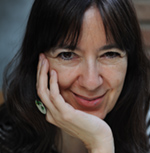Dwelling
This cheetah in my fingers
is not enough,
its speed macerated
in distilled sediment,
its body in a torrent,
breaking loose—
from the stilled water
in this cup,
walls unflowing,
a row of girls
in their beds,
runners that dream
about a soft wind
and emit a whistle
like a slow boil,
low heat
in the kitchens
of the world.
Inject yourself with lime
from these walls,
slow what’s fast,
tuck yourself within the metal
of the key,
listen to the low flight
of the rooftops,
their corralled animal
migration announcing
a new station
freely upon arrival
in the steppes.
No basta el guepardo
en los dedos,
su carrera macerada
en el alcohol
del reposo,
el cuerpo en torrente,
desbocado,
del agua detenida
en esta copa,
no fluyen los muros
de clausura,
una fila de niñas
en sus camas,
corredores que sueñan
con un viento de superficie
y emiten un silbido
de hervor ralentizado
en las cocinas
del mundo,
a fuego lento,
hay que inyectarse la cal
de estas paredes,
aquietar la voz,
recluirse en el metal
de la llave,
escuchar el vuelo bajo
de los techos,
su migración de animal
acorralado que anuncia,
sin pausas de contención
en la llegada,
una nueva estación
de las estepas.
We fish for color
with a net of rain
around the neck
of the house.
It’s clearing up
in the next room,
the breeze rustling the curtains
means it’s time to travel,
and on the carpet
we remember the animal
as a lone piece
from a game won
in stillness.
We’ve all forgotten the race,
the whistle reaches all our ears
we’ve conquered our obstacles
like foals with unsteady hooves
over newborn white rocks.
The riverbed’s truest course
is slow immersion.
Pescamos el color
con una red de lluvia
en torno al cuello
de la casa.
En este otro cuarto
ya clarea,
se anticipa el viaje
en el vaivén
de las cortinas,
sobre la alfombra
recordamos al animal
como pieza única
de un juego que se gana
en lo inmóvil.
Se olvida la carrera,
un silbato para cada oído
se asumen los obstáculos
en las pezuñas vacilantes
de los potros
sobre las crías blancas
de las piedras.
Lenta, la inmersión
es el abajo del río.
Su cauce más sincero.
She went about burying him,
transplanting
his loosened leaves
in the interior garden,
one by one.
The naked sap rose up,
and the erasure was a canvas
of thread, smooth to the touch
and without color.
She went about digging
in the dampened earth,
her anger gone,
laying his feet at rest,
as though he were still
a child lost in thought.
Seated on
the mulch,
rain, mist, vegetal
scent,
her change
emerged with the quiet,
without a right flank
nor left eye,
without leaks
or edges.
Fue enterrándolo,
transplantando
al jardín interior,
una a una,
sus hojas desprendidas.
La savia manaba vertical
en el desnudo,
y el borrado era un lienzo
de hilo, de tacto suavísimo
y color incierto.
Fue escarbando sin rabia
en la tierra humedecida,
introduciendo sus pies
de niño absorto
en el descanso.
Sentada sobre
el mantillo,
siendo lluvia,
vaho, olor
vegetal,
fue en la quietud
el desarrollo,
sin flanco derecho
ni ojo izquierdo,
sin fugas
ni contornos.
I bathed
on the water’s surface,
my throat burning
with choked
sound,
my body in slow descent,
suspended from
some piece of wood.
I submerged myself
in the reflection of the pond,
soaring
in a leap of heights
without weights
or measurements,
boats and lighthouses
at rest.
Growing dizzy,
I lifted the water’s hair
and braided it
without getting wet,
and below
the workers continued,
baking breads
from ash.
My feet are learning
their alphabet,
I punctured the cloud
from here in the nucleus,
and now I’m flooded
by a white hemorrhage
when I walk.
Me he bañado
por encima del agua,
con la llama del sonido
sofocado,
con la caída lenta
y en suspenso
de un objeto diminuto,
de madera,
me he sumergido
en el reflejo del estanque,
sobrevolando,
en un salto de altura
sin pesos ni medidas,
barcos y faros
en reposo,
he tomado con vértigo
los cabellos del agua,
los he trenzado
sin mojarme,
y abajo seguían
trabajando,
horneando los panes
de ceniza,
he punzado la nube,
desde el núcleo,
y ahora que los pies
aprenden su alfabeto,
me inunda al caminar
una blanca hemorragia.
Translator’s Note:
Esther Ramón, born in 1970, lives in Madrid, where she taught one of my very first writing workshops at various café tables in Lavapiés more than a decade ago. She skillfully introduced me and fellow students to what it could mean to truly collaborate, to be interdisciplinary, to go beyond looking at a painting while writing a poem and, instead, enter into the methods and mindsets of different mediums, seeing the world not only in a different language (in my case) but with a more creative intention. She continues to collaborate with other artists, and it feels meaningful to translate her work—in a sense collaborate too—and become involved in her poetic world so many years later.
In Morada (Dwelling), published in 2015, Ramón presents our human participation in and collaboration with nature, beginning with the simplicity of seeking shelter, and even moving to burial and decomposition. In her description of this collection, she writes: “The first and last refuge is a hole — excavated by hand — in the uncomfortable earth.” Her litanies of incongruous images in short lines are full of movement within and through uncomfortable interiors: “… an aroma that spreads / through the hair / through the buckets of rice / through the musical carpet / through the flasks, / inside the bedroom / and nothing burns.” One challenge of short lines is the quantity of articles and prepositions that need careful placement in English. The movement of images easily chokes on small bits of grammar, and in my drafts I ended up with lines made up entirely of prepositions and articles as I shifted things around.
Translating this volume, I can’t help but keep thinking of Gaston Bachelard and The Poetics of Space, and I’ve been trying to keep the imaginative interior as a central figure while I work. These poems take us through physical, yet dreamlike spaces we have a sense of, but no real concrete grasp of. As readers, we are allowed to surface our own dreams and subconscious. The absence of a strong “I” in nearly all the poems in this volume creates a centering of space as the main figure or character. Beyond that, it also creates a sense of collective, observed experience. Ramón intentionally avoids an active agent for her verbs, she focuses on infinitives and passive constructions. I have found myself turning to imperative verbs in English, like musing internally to oneself, or to no one in particular. That these words dwell in our own interiors, as readers, is what matters.

Esther Ramón is a poet, critic and professor from Madrid, Spain. She has published nine volumes of poetry, and earned the Premio Ojo Crítico in 2008. Her poems have been translated from Spanish into various languages and she appears in the US anthology Panic Cure: Poetry from Spain for the 21st Century (Otis Books, 2014). She has been coordinating editor for the journal Minerva, director of radio poetry programming for Radio Círculo, and is currently a professor at Universidad Carlos III in Madrid.

Emma Ferguson is a poet, translator, and educator from Seattle. She has been a scholarship recipient for the Breadloaf Translators’ Conference, and is currently translating the collection Dwelling (2015) by Esther Ramón, among other projects. Most recently her translations can be found at Columbia Journal and The Offing and forthcoming from The Common, while her poems can most recently be found at The Bookends Review and River Heron Review, and forthcoming from Rock & Sling and Passengers. She grows vegetables, brews beer, and plays piano.

 BACK TO ISSUE
BACK TO ISSUE